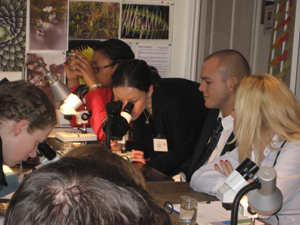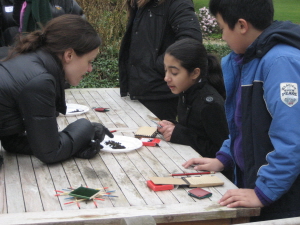Make a donation
Help us make the ordinary extraordinary for children, young people and teachers.
The Nature and History of Science
14/05/2012 at 19:50
 The foundation of Darwin Inspired Learning is the idea that Darwin’s life and work can be used as an instructional tool and a source of inspiration. The literature looking at how science is experienced by students in school describes a general experience that is at odds with this approach. There is a focus in the formal science education system on the acquisition of factual knowledge, leaving little room for any exploration of the nature of science and the contribution of historical and social accounts (Irwin, 2000). I personally have witnessed how teachers are required to deal with a content-heavy and assessment-driven curriculum and understand the practical limitations they have to negotiate. However, there is a very strong argument that the teaching of evolution in particular requires a fresh approach.
The foundation of Darwin Inspired Learning is the idea that Darwin’s life and work can be used as an instructional tool and a source of inspiration. The literature looking at how science is experienced by students in school describes a general experience that is at odds with this approach. There is a focus in the formal science education system on the acquisition of factual knowledge, leaving little room for any exploration of the nature of science and the contribution of historical and social accounts (Irwin, 2000). I personally have witnessed how teachers are required to deal with a content-heavy and assessment-driven curriculum and understand the practical limitations they have to negotiate. However, there is a very strong argument that the teaching of evolution in particular requires a fresh approach.Research evidence suggests that there is an inadequate understanding of evolution by natural selection amongst school students in the UK and across the world. Misconceptions associated with ideas about human evolution and a relationship with improvement and progress are common. Perceived conflicts with personal religious beliefs have also caused concern and a crisis in the teaching of evolution appears to be developing (Marco, 1994). What can Darwin Inspired Learning contribute to the debate and does it offer any solutions?
 Darwin Inspired Learning is based, at least in part, on the constructivist position which proposes that learning is socially constructed (Piaget, 1950). We each develop our knowledge and understanding of the world by building on previous experience and through direct interaction with it. This allows the development of a shared understanding which is heavily influenced by context. Students and teachers learn about evolution not only through formal education but by experiences in the wider world. Darwin has been reinterpreted by many people with diverse agendas and our understanding of his ideas may be heavily influenced by several competing perspectives. His ideas are simple but subtle and the scope for misunderstanding is significant. This presents an argument for not going back to basics exactly but returning to Darwin; to learning directly from his writings, his experiments, his life.
Darwin Inspired Learning is based, at least in part, on the constructivist position which proposes that learning is socially constructed (Piaget, 1950). We each develop our knowledge and understanding of the world by building on previous experience and through direct interaction with it. This allows the development of a shared understanding which is heavily influenced by context. Students and teachers learn about evolution not only through formal education but by experiences in the wider world. Darwin has been reinterpreted by many people with diverse agendas and our understanding of his ideas may be heavily influenced by several competing perspectives. His ideas are simple but subtle and the scope for misunderstanding is significant. This presents an argument for not going back to basics exactly but returning to Darwin; to learning directly from his writings, his experiments, his life.One misconception is that Darwin had a moment of revelation in which he came up with his theory. The reality was that he made an observation that intrigued him and this led him to ask questions and seek to answer them. This took many years and led to the development of a sophisticated and nuanced argument that provided an explanation for observed phenomena. This approach defines Darwin Inspired Learning. Anyone can notice something, we just have to look, and children in particular are naturally curious and want to ask questions. The fundamentals of Darwin Inspired Learning are there but we need to know how to tap into them.
Science based on the classical physical laws as it is taught in schools seeks to simplify. The work of Darwin in common with other natural historians seeks to describe nature as it is and look for patterns in the complexity, to seek understanding rather than simplification. As one author put it this means that “Darwin’s model cannot be passively demonstrated for students.” (Rudolph and Stewart, 1998: 1085). Darwin Inspired Learning provides a framework to learn directly and actively from the natural world. As an organisation we are committed to promoting this approach but also to develop a true understanding of it. We are therefore carrying out research into the origins, meaning and impact of Darwin Inspired Learning on its practitioners and the teachers and students that encounter it in a Darwin Inspired desire to understand.
Emma Newall, Education Consultant, Charles Darwin Trust, 5th April 2012.
Irwin, A. R. (2000) Historical Case Studies: Teaching the Nature of Science in Context, Science Education, 84(1): 5-26.
Marco, N. And Bizzo, V. (1994) From Down House Landlord to Brazilian High School Students: What Has Happened to Evolutionary Knowledge on the Way? J. of Research in Science Teaching, 31(5): 537-556.
Piaget, J. (1950) The Pscychology of intelligence, London: Routledge and Kegan Paul.
Rudolph, J. L. and Stewart, J. (1998) Evolution and the Nature of Science: On the Historical Discord and its Implications for Education, J. of Research in Science Teaching, 35(10): 1069-1089.

